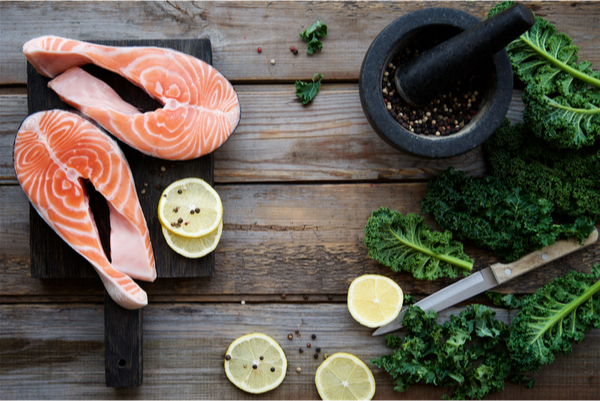If you want to reduce your risk of developing heart disease, eating the right foods can go a long way to help.
Heart disease kills more than twice as many women as breast cancer. Latest figures from the British Heart Foundation show there are currently 3.5 million women living with heart and circulatory disease in the UK.
Risk factors include: smoking, high cholesterol and blood pressure, diabetes, a family history of heart disease and lack of exercise.
Post-menopausal women also have a higher risk due the drop in oestrogen, which has a protective effect.
But the good news is you don’t have to develop problems. ‘The most powerful factor that will help to prevent and also treat heart disease is your diet,’ says Dr Chidi Ngwaba who specialises in lifestyle medicine.
Life-changing choices
‘Lifestyle factors are important too but a healthy diet is key. There was an experiment done at the Cleveland Clinic, Ohio, in the 90s where 18 patients with severe heart disease were asked to change their diet. The diet was wholly plant-based, with no animal fats or refined sugar. Before starting the investigation, the patients had collectively experienced 50 different cardiac events including heart attack and chest pains,’ says Dr Chidi.
‘Within two months of changing what they ate, the subjects’ cholesterol levels had halved and there were no symptoms or cardiac incidents. When follow-up angiograms were carried out, it was shown that for 70 per cent of the participants in the study, their arteries were opening up!’
Fill up on fibre
So what should you eat to safeguard your cardiovascular health? ‘The heart relies on lots of healthy fibre from vegetables and fruit,’ says nutritional therapist Rick Hay (rickhay.co.uk). ‘If you’re not eating enough fibre, you’re more likely to develop digestive disturbances (dysbiosis) such as bloating and malabsorption caused by an imbalance of bacteria in the gut.
‘Research suggests the chemicals released by good bacteria may help to activate receptors in the blood vessels to lower pressure. Scientists are carrying out more research into how these bacteria may have a protective effect on heart health,’ he says.
So, eating fibre-rich, plant-based foods that encourage healthy bacteria in the gut is important.
One study, reported by the European Society of Cardiology, 2018, showed that heart patients who ate more fibre and had healthier gut bacteria lived longer than patients who consumed meat and had higher levels of unhealthy bacteria in the gut.
Foods for a healthy heart
 Keep your ticker in good working order by adding these heart-friendly foods to your diet…
Keep your ticker in good working order by adding these heart-friendly foods to your diet…
LEAFY GREENS These contain antioxidant help your arteries release nitric oxide, opening them up and reducing blood pressure.
RED FOODS Both red and purple fruits and vegetables contain polyphenols – antioxidants with powerful protective properties that are beneficial for vascular and heart health. Think apples, peppers, strawberries, berries, beetroot, watermelon, radish, pomegranate and tomatoes.
ARTICHOKE Globe artichoke has been found to inhibit the manufacture of cholesterol, as well as encouraging its breakdown and reducing its absorption in the gut. It also increases bile production and flow, thereby helping you process fats.
OILY FISH Wild salmon, mackerel, herring, trout and sardines are all types of oily fish rich in protective omega-3 fatty acids, which have an anti-inflammatory affect.
FLAXSEEDS (Also called linseeds) These little yellow seeds contain omega-3 fatty acids and fibre.
WALNUTS These contain omega-3 fatty acids.
RED WINE The resveratrol in red wine is a powerful antioxidant – one glass is sufficient!
OATS Packed with both soluble and insoluble fibre, oats keep blood sugar levels stable and also contain beta glucan, which can help to lower cholesterol.
Supplements to support your heart health
Co-enzyme Q10. Studies show this reduces blood pressure and helps support the heart muscle. Research also suggests that CoQ10 may help ease angina. Look for ubiquinol as it’s a more readily absorbable form of co-enzyme Q10. Try Healthspan Ubiquinol Max (£32.95 for 60, healthspan.co.uk).
B vitamins. Folic acid, B6 and B12 all help to reduce levels of homocysteine, an amino acid that, when elevated, has been shown to contribute to atherosclerosis – hardening of the arteries accompanied by the build up of fatty plaques – and coronary heart disease. Homocysteine levels can be high if vitamin B is lacking in your diet.
Try Altrient Liposomal Vitamin B and mineral complex (£54.99 for 60 1000mg gel sachets, abundanceandhealth.co.uk).
Citrus bergamot. A recent study showed that the Italian fruit Calabrian Citrus Bergamot lowers cholesterol. The research, carried out by scientists at the University Magna Graecia, Italy, showed it not only reduced LDL cholesterol but improved ‘good’ HDL cholesterol. Try BergaMet (£39 for 60, bergamet.co.uk).
Hawthorn. In studies, extract of hawthorn has been shown to improve blood flow, heart rhythm and cardiac function. Try A. Vogel Hawthorn (£10.50 for 50ml, avogel.co.uk).
Herbal Teas can help
Hawthorn can help improve blood flow, heart rhythm and cardiac function.
Rosehips contain heart protective antioxidants that may help to rediuce blood pressure. They are also rich in vitamin C, which is beneficial for heart health.
Ginger promotes healthy blood circulation.







